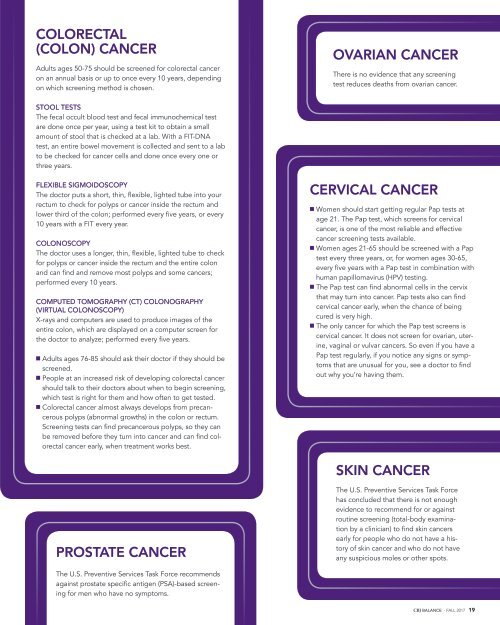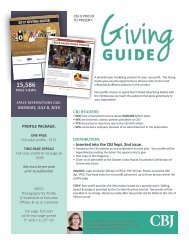CBJ BALANCE Summer 2017
Create successful ePaper yourself
Turn your PDF publications into a flip-book with our unique Google optimized e-Paper software.
COLORECTAL<br />
(COLON) CANCER<br />
Adults ages 50-75 should be screened for colorectal cancer<br />
on an annual basis or up to once every 10 years, depending<br />
on which screening method is chosen.<br />
OVARIAN CANCER<br />
There is no evidence that any screening<br />
test reduces deaths from ovarian cancer.<br />
STOOL TESTS<br />
The fecal occult blood test and fecal immunochemical test<br />
are done once per year, using a test kit to obtain a small<br />
amount of stool that is checked at a lab. With a FIT-DNA<br />
test, an entire bowel movement is collected and sent to a lab<br />
to be checked for cancer cells and done once every one or<br />
three years.<br />
FLEXIBLE SIGMOIDOSCOPY<br />
The doctor puts a short, thin, flexible, lighted tube into your<br />
rectum to check for polyps or cancer inside the rectum and<br />
lower third of the colon; performed every five years, or every<br />
10 years with a FIT every year.<br />
COLONOSCOPY<br />
The doctor uses a longer, thin, flexible, lighted tube to check<br />
for polyps or cancer inside the rectum and the entire colon<br />
and can find and remove most polyps and some cancers;<br />
performed every 10 years.<br />
COMPUTED TOMOGRAPHY (CT) COLONOGRAPHY<br />
(VIRTUAL COLONOSCOPY)<br />
X-rays and computers are used to produce images of the<br />
entire colon, which are displayed on a computer screen for<br />
the doctor to analyze; performed every five years.<br />
n Adults ages 76-85 should ask their doctor if they should be<br />
screened.<br />
n People at an increased risk of developing colorectal cancer<br />
should talk to their doctors about when to begin screening,<br />
which test is right for them and how often to get tested.<br />
n Colorectal cancer almost always develops from precancerous<br />
polyps (abnormal growths) in the colon or rectum.<br />
Screening tests can find precancerous polyps, so they can<br />
be removed before they turn into cancer and can find colorectal<br />
cancer early, when treatment works best.<br />
CERVICAL CANCER<br />
n Women should start getting regular Pap tests at<br />
age 21. The Pap test, which screens for cervical<br />
cancer, is one of the most reliable and effective<br />
cancer screening tests available.<br />
n Women ages 21-65 should be screened with a Pap<br />
test every three years, or, for women ages 30-65,<br />
every five years with a Pap test in combination with<br />
human papillomavirus (HPV) testing.<br />
n The Pap test can find abnormal cells in the cervix<br />
that may turn into cancer. Pap tests also can find<br />
cervical cancer early, when the chance of being<br />
cured is very high.<br />
n The only cancer for which the Pap test screens is<br />
cervical cancer. It does not screen for ovarian, uterine,<br />
vaginal or vulvar cancers. So even if you have a<br />
Pap test regularly, if you notice any signs or symptoms<br />
that are unusual for you, see a doctor to find<br />
out why you’re having them.<br />
SKIN CANCER<br />
PROSTATE CANCER<br />
The U.S. Preventive Services Task Force<br />
has concluded that there is not enough<br />
evidence to recommend for or against<br />
routine screening (total-body examination<br />
by a clinician) to find skin cancers<br />
early for people who do not have a history<br />
of skin cancer and who do not have<br />
any suspicious moles or other spots.<br />
The U.S. Preventive Services Task Force recommends<br />
against prostate specific antigen (PSA)-based screening<br />
for men who have no symptoms.<br />
<strong>CBJ</strong> <strong>BALANCE</strong> - FALL <strong>2017</strong> 19
















